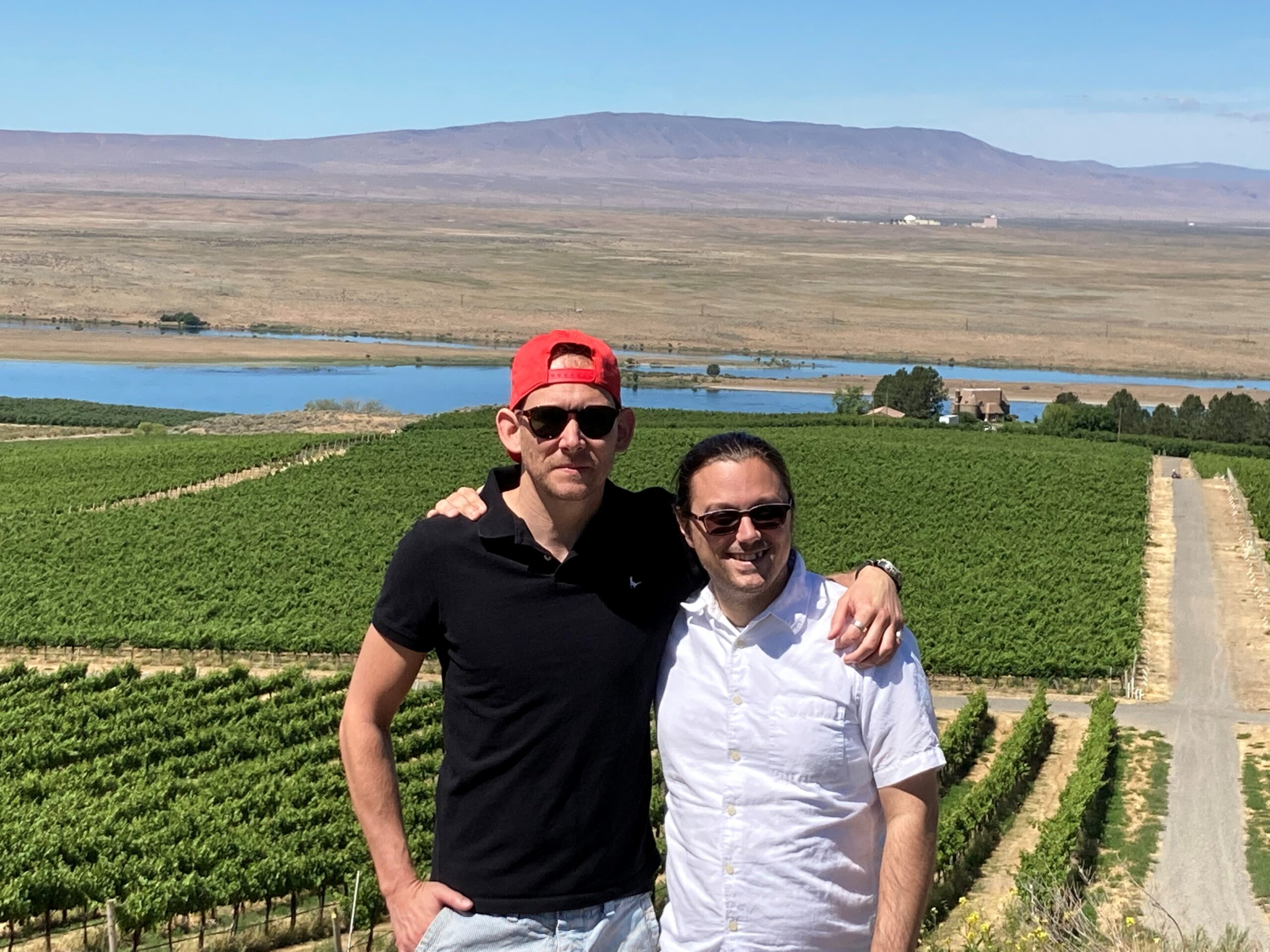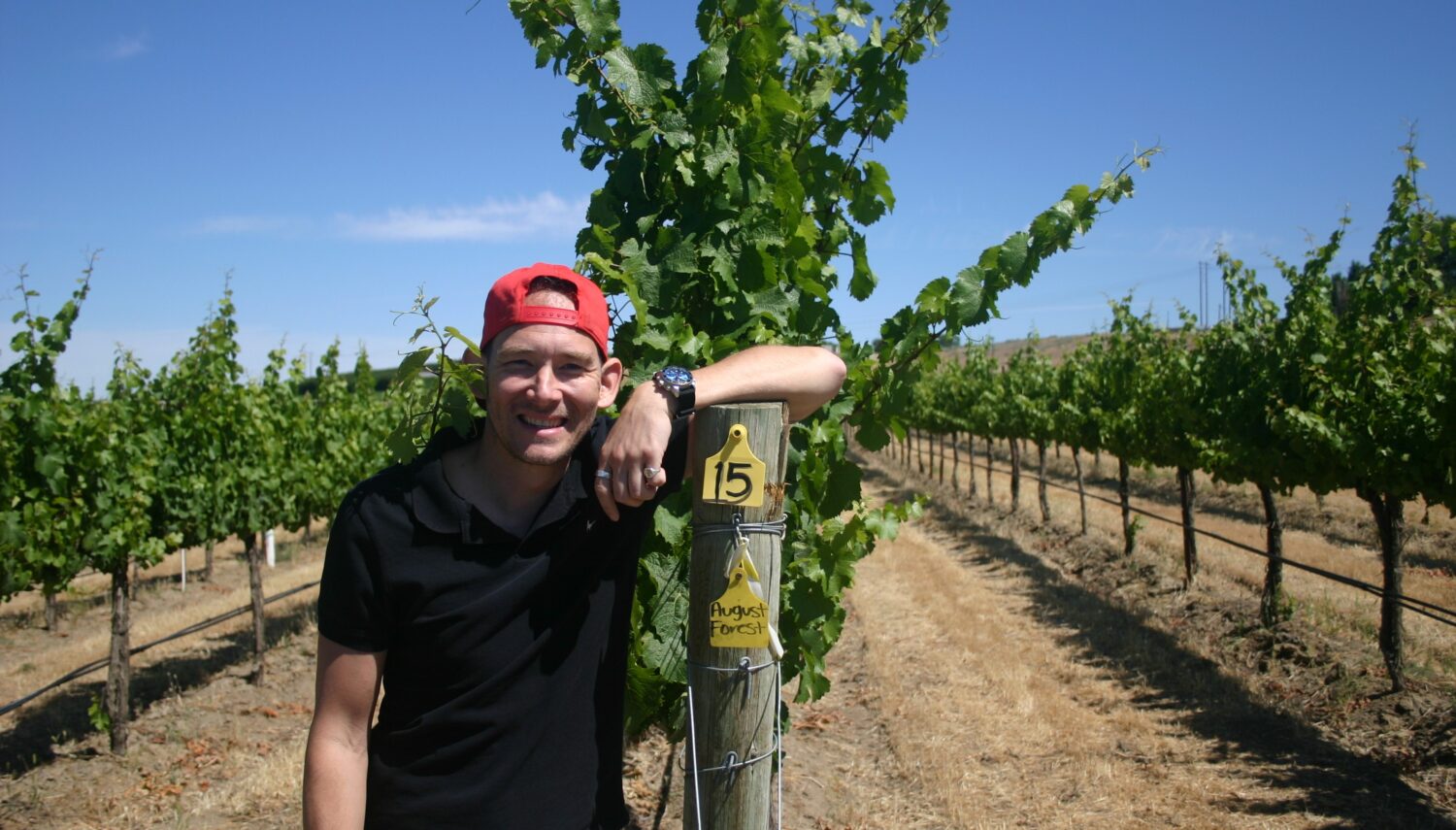An interview with recent grad Forest Rogers-Phillips of August Forest Wines by Skip Watson
I would like to introduce you to Forest Rogers-Phillips, a recent graduate of the Enology and Viticulture program at Walla Walla Community College. Originally from Virginia he was drawn to the EV Program at WWCC after hearing of its impressive reputation to produce some of the best and brightest winemakers in the country. He hasn’t wasted any time after graduating and has teamed up with fellow classmate Charles “C.J.” Augustine to start their very own label making wine from Washington. I sat down with Forest in late January to ask him about his take on the Washington wine industry and his journey.

Skip Watson: How did you get into wine?
Forest Rogers-Phillips: I got into wine first working for a fine dining wine bar in Richmond Virginia circa 2004, then working for Pearmund Cellars in Virginia starting in 2009. Before that I had been into wine but had not found my calling. Being in the tasting room talking with people about the wine sparked something new, and I was hooked. This led to the production side of things, which then brought me to the position of assistant winemaker, and I worked for Pearmund Cellars until 2016. The following year I decided to branch out, becoming assistant winemaker for The Winery at La Grange also in Virginia for the 2017 vintage.
SW: Is there someone in the EV world that you admire, including fellow EV alums?
FR: There are so many people who helped me along this journey! I can start with Chris Pearmund, who gave me the chance to work in every level of the winery and was very supportive while teaching me many things along the way. Seth Chambers for bringing me on at La Grange for the 2017 vintage. Aaron and CC Peet who run production for Cellar Door Winery in Maine. Without them I would not have heard of this amazing program here in Walla Walla. A huge thanks to all my professors, and my classmates at The Center for Enology and Viticulture. The support has been epic!!
SW: What’s special to you about working in the wine industry?
FR: Our industry allows me to see the joy people have when tasting the wine I have had so much to do with. The whole process from grape to glass is such a wonderful adventure. I love talking, sharing, and producing wine that people are excited about. It makes a big difference when I can be there to answer questions and taste through wines with likeminded people.
SW: What’s special to you about working in the wine industry?
FR: My favorite part is tasting the wine throughout fermentation, then at the end when everything starts to come together, and you can feel what the finished wine will be like. The way it changes every time we sample it is like nothing else. This brings me the greatest joy.
SW: What are some of the challenges you’ve faced in the industry?
FR: Some of the greatest challenges I have faced in our industry was deciding that I needed to leave the comfort of the Virginia wineries I had become familiar with, and transition to new out of state wine experiences that would take me to greater heights in my career. There is always a risk, and to take that leap was a hard thing to do, but worth every second. When CJ Augustine and I talked about starting August Forest we had a pretty good idea of the amount of effort, time, and cost involved in starting a wine label. With the help of our professors, and fellow peers we were able to navigate through this challenging process successfully, and without any major upsets.
SW: What do you think differentiates and excites you about Washington wine?
FR: The wine industry here in Washington is something of another animal. Having come from the east where not only the wine is different, but also the culture surrounding the wine. When I arrived in Walla Walla, I was pleasantly surprised to find myself in a community of wine enthusiasts that not only produce fine wines but also support the community in surprising ways. Sharing experiences about wine with winemakers from around the globe and learning in an excellent enology program made me feel as if I had walked into another world entirely. Washington enjoys a variety of outstanding AVA’s that make Washington wine stand out in the country. This matched with the supportive wine community makes the Washington wine industry a force to be reconned with and a truly exciting place to make wine.
SW: How do you foresee climate change or social issues affecting the local industry in the next few years?
FR: The world today is not what it once was. A warming climate is wreaking havoc around the planet with the magnification of storms, wildfires and even pandemics. The wine industry is not immune to these changes. Globally the warming climate is causing a shift in the traditional range of grape varietals. Some regions have even seen their vineyards burn and even if the vines themselves are not burning, the enormous amounts of smoke enveloping whole regions have tainted the grape crop. Washington wine is not immune to this threat. In 2020 smoke from surrounding wildfires blew into the Walla Walla valley causing smoke taint. Looking at it through a wider lens, the regions affected by climate change are part of a greater country, the United States, and the world that must put in place major changes to address the dire climate situation. In the immediate future the climate challenges facing Washington Wine would be in my eyes smoke taint from wildfires. We should consider the effects climate change has on wine tourism in the region. For example, smoke may be too thick for planes to land, and makes for an unhealthy air quality. Workers also suffer from poor air quality when they are out working in the vineyards. Going forward water is a huge issue especially east of the Cascades. Aquifer depletion and lack of rain and snowfall pose a serious threat to the agricultural way of life in Walla Walla.
SW: What are some up-and-coming trends in wine that you’re following?
FR: One of the most interesting trends I have been following in the last years is the organic, biodynamic, and natural wines. I see these as being an old answer to new problems. Organic and biodynamic production cares for the land and the vines in a way that keeps a balance with nature. In addition, growing grapes in this way not only regenerates land, but it also protects the environment including the water ways that are vital. Certifications like Salmon Safe are in my eyes the future of our industry. It involves thinking beyond the borders of our vineyards and the impact we have on the environment. Natural wine taps into the native yeasts found on the grapes. This is the most back to basics way of wine making omitting the additives that have become mainstays in the modern wine industry. Consumers are increasingly mindful of what they are putting in their bodies and how the products they consume impact the world.
SW: What advice can you share with future EV graduates?
FR: I think it is essential to support each other above all in our industry, and make sure we thrive in an uncertain climate that surrounds the Washington wine industry. Pay your dues, working from the bottom up to where you want to be is part of it. Learn from as many great winemakers and vineyard managers as you can, this will give you a better view of where you will fit best. Always have fun and be open to new experiences with a good attitude.


Join the Conversation